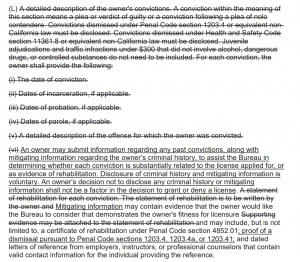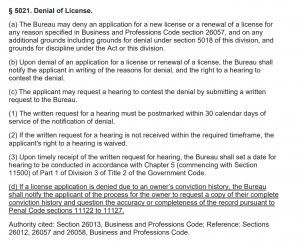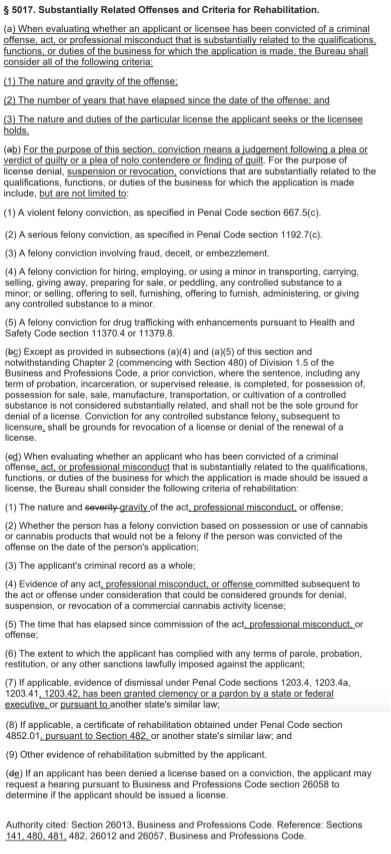Proposed Amendments to BCC Regulations Would Modify Conviction Disclosure Requirements
By Lauren Mendelsohn
October 27, 2020
On Friday, October 16, the Bureau of Cannabis Control (“the Bureau” or “BCC”) released proposed amendments to its regulations which would modify the criminal history disclosure requirements that cannabis license owners must provide in order to be eligible for licensure. This was done in response to Assembly Bill 2138 (“AB 2138”), a law passed in 2018 and codified in various sections of the Business and Professions Code. Specifically, the sections that the Bureau is proposing to modify include §5002, §5017, §5021, and §5600. You can read the proposed amendments and the accompanying documents here:
- Text of Proposed Amendments
- Notice of Proposed Rulemaking (NOPR)
- Initial Statement of Reasons (ISOR)
Currently, applicants are required to provide a “detailed description of the owner’s convictions,” including the date of conviction, dates of incarceration, dates of probation, dates of parole, and a detailed description of the offense. Convictions that have been expunged must be disclosed, as well as convictions modified as a result of Prop. 64 and certain juvenile convictions. (§5002(b)(20)(L); §5600(g)(19)(L).)
The proposed amendments would relieve many owner-applicants of the burden of providing details about their past convictions. Furthermore, the amended regulations would clarify that the decision of whether to provide this information should not be a factor in denying a license to an owner-applicant. Of course, applicant-owners may continue to voluntarily provide this information if desired, so that the Bureau can determine whether the conviction is substantially related to the license applied for, or as evidence of rehabilitation.
Applicants would still undergo a LiveScan background check, so the Bureau will have a copy of the applicant’s criminal history record.

Part of BCC §5002, with proposed changes.
The proposed amendments would also require that the Bureau provide information about how to request a copy of the owner’s criminal history record and how to question the accuracy of this record in the event that an application is not approved. (Proposed §5021(d).) This would be in addition to the information the BCC already provides an applicant upon denial, including the reasons for denial and instructions for how to appeal the decision.

BCC §5021 with proposed changes.
In accordance with AB2138 (which amended, among other sections, §481 and §493 of the Business Professions Code), the proposed amendments spell out three criteria that the BCC must use when determining whether a past conviction is “substantially related to the qualifications, functions, or duties of the profession” for the purposes of denying, suspending, or revoking a license. These criteria are:
- The nature and gravity of the offense;
- The number of years that have elapsed since the date of the offense; and
- The nature and duties of the particular license the applicant seeks or the licensee holds.
(Proposed 5017(a).) Certain types of convictions stemming from violent, fraudulent, or other types of serious criminal activity are already automatically considered “substantially related” in this context; the proposed amendments would broaden this category by adding the words “but not limited to” after the word “including” in what would become §5017(b). The proposed amendments would also add “professional misconduct” as something that could result in a license denial in accordance with AB2138.

BCC §5017 with proposed changes.
Section 5017 requires the BCC to consider evidence of rehabilitation when deciding whether a previous criminal offense, act, or instance of professional misconduct is “substantially related to the qualifications, functions, or duties of the business for which the application is made should be issued a license,” and the proposed amendments modify this slightly by adding evidence of clemency or a pardon issued by a state or federal executive and evidence of rehabilitation under §482 of the Business and Professions Code (which has to do with rehabilitation evaluations by licensing boards within the Department of Consumer Affairs) to the information that the BCC must consider.
We noticed an inconsistency in the Initial Statement of Reasons (ISOR) and the proposed text of §5017(d)(8). The ISOR states that “Section 5017 subsection (d)(8) has been revised to add ‘pursuant to BPC 482’ to better comply with AB 2138 by providing the applicant or previously disciplined licensee a clear roadmap that they can follow to obtain a license.” (ISOR, page 3.) However, the proposed text of this section simply refers to “Section 482” without specifying which Code is being referred to, and immediately preceding this the Penal Code is referenced, which incorrectly implies that the Section 482 mentioned is also from the Penal Code. Penal Code §482 has nothing to do with rehabilitation, while Business and Professions Code §482 does and is clearly what is intended to be referenced given what is stated in the ISOR.
Additionally, although the text of the proposed regulations does not mention this, AB2138 amended §480 of the Business and Professions Code to include some new instances when the BCC may deny a license based on an applicant’s previous conviction(s) or instance(s) of formal discipline. These are discussed in the Notice of Proposed Rulemaking (NOPR):
- The conviction was in the past seven years and is substantially related to the qualifications, functions, or duties of the business or profession; or
- The conviction is substantially related to the qualifications, functions, or duties of the business or profession and was for a serious felony, as defined in Penal Code section 1192.7, and certain specified sex offenses, even if the conviction occurred more than seven years ago; or
- The applicant is presently incarcerated or was released from incarceration within the last seven years for a crime that is substantially related to the qualifications, functions, or duties of the business or profession; or
- The applicant was released from incarceration more than seven years ago for a crime that is substantially related to the qualifications, functions, or duties of the business or profession and the conviction was for a serious felony, as defined in Penal Code section 1192.7, and certain specified sex offenses; or
- The applicant has been subject to formal discipline by a licensing board or bureau in or outside of California within the preceding seven years based on substantially related professional misconduct.
(NOPR, page 3.) The proposed amendments to §5600, which deals with applications for event organizer licenses, reflect the proposed amendments for other types of BCC licensees discussed above.
It is important to note that these proposed amendments would only apply to applicants licensed by the Bureau of Cannabis Control, which includes distributors, testing laboratories, storefront retailers, delivery-only retailers, microbusinesses, and event organizers. Cultivators and manufacturers, who are licensed by the Department of Food and Agriculture and the Department of Public Health, respectively, will still have to provide the criminal history information called for in the applicable agency’s regulations. This is because the underlying statutory change that prompted the BCC’s proposed amendments is specific to licensing decisions made by the Department of Consumer Affairs, which the BCC is part of.
Comments on the proposed amendments must be submitted by 5:00pm PST on December 1 to:
Kaila Fayne
Bureau of Cannabis Control
2920 Kilgore Road
Rancho Cordova, CA, 95670
E-mail: BCC.comments@dca.ca.gov
For more information, visit the BCC’s website.
This information is provided as a public educational service and is not intended as legal advice. For specific questions related to cannabis licensing in California, please contact the Law Offices of Omar Figueroa at 707-829-0215 or info@omarfigueroa.com to schedule a confidential legal consultation.

